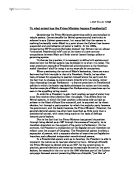The prerogative has allowed powers to move from Monarch to Ministers without Parliament having a say in how they are exercised
"The prerogative has allowed powers to move from Monarch to Ministers without Parliament having a say in how they are exercised. This should no longer be acceptable to Parliament or the people." Discuss whether ministerial accountability is adequately addressed under the UK constitution
The Royal Prerogative has allowed a wide array of discretionary powers to be delegated from the Monarch to ministers without a need to seek parliamentary approval. This system is both unjust and undemocratic as it leaves a number of largely unchecked powers in the hands of a privileged few. These powers, including the ability to ratify treaties, declare war, regulate the civil service and appoint ministers, have a profound effect on the lives of the citizens of the United Kingdom and therefore it is necessary for them to be regulated by Parliament, the democratically elected body of the British people.
While there are no legal rules governing how ministers can exercise the prerogative, they are subject to a number of non-legal rules and conventions, in particular the convention of ministerial responsibility. As FM Maitland states this is the principle that "for every exercise of royal power some minister is answerable."1 Ministers are collectively responsible to parliament for their administration and policy, as well as, being individually responsible for their own personal conduct and conduct of their department. If a minister does not adhere to the acceptable standards they can be compelled or forced to resign. Ministers are, therefore, accountable to Parliament for the decisions that they make using the prerogative and their use of powers is subject to scrutiny by Departmental Select Committees. It could, therefore, be surmised that Parliament has sufficient constitutional authority over how ministers exercise their powers.
The Royal Prerogative has allowed a wide array of discretionary powers to be delegated from the Monarch to ministers without a need to seek parliamentary approval. This system is both unjust and undemocratic as it leaves a number of largely unchecked powers in the hands of a privileged few. These powers, including the ability to ratify treaties, declare war, regulate the civil service and appoint ministers, have a profound effect on the lives of the citizens of the United Kingdom and therefore it is necessary for them to be regulated by Parliament, the democratically elected body of the British people.
While there are no legal rules governing how ministers can exercise the prerogative, they are subject to a number of non-legal rules and conventions, in particular the convention of ministerial responsibility. As FM Maitland states this is the principle that "for every exercise of royal power some minister is answerable."1 Ministers are collectively responsible to parliament for their administration and policy, as well as, being individually responsible for their own personal conduct and conduct of their department. If a minister does not adhere to the acceptable standards they can be compelled or forced to resign. Ministers are, therefore, accountable to Parliament for the decisions that they make using the prerogative and their use of powers is subject to scrutiny by Departmental Select Committees. It could, therefore, be surmised that Parliament has sufficient constitutional authority over how ministers exercise their powers.







